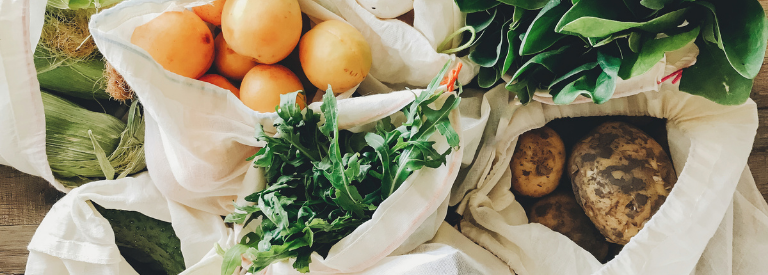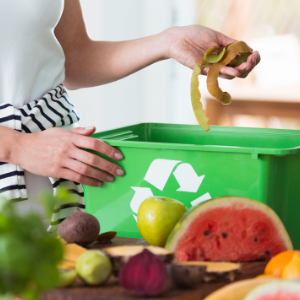Restaurants are taking sustainability to the next level by maximizing their resources to minimize their waste. From the food scraps that are thrown out in the kitchen to the food leftover on guests’ plates, the food and beverage industry inherently produces tons of waste. Now, long gone are the days of kitchen staff tossing away lemon peels, and here are the days where 10% of that lemon is used as a garnish and the other 90% is used in a sauce. Whether it’s the ingredients they use or the suppliers they work with, restaurants are creating programs to eliminate any waste in their business.

What Is Zero-Waste Cooking?
Zero-waste cooking is the process of using up or donating any products that enter your establishment. This means that restaurants do not throw away any trash or excess food by either using up all of their ingredients or composting leftovers with the ultimate goal of eliminating any waste being sent to a landfill. The practice of zero waste is reducing your needs, reusing what you can, and lessening the amount of waste collecting in landfills.
How To Accomplish A Zero-Waste Restaurant
While the idea of eliminating all waste from your establishment may sound daunting, it’s the little steps you do every day that can help you easily transition to getting as close as possible. Here are a few ways on how to switch your business to a zero-waste establishment:
Reduce The Amount Of Food You Order
This technique includes only stocking ingredients that your restaurant will be using and serving to guests to be consumed. No more, no less.
Create a food waste inventory to measure how much food is being wasted and where. This allows managers to monitor what foods aren’t being consumed and can be potentially removed from the menu. Also, work with your kitchen staff to curate menus that utilize every part of each ingredient you purchase. This allows you to get an inside look at feedback servers have collected from customers and create a menu that is satisfactory to the wants of your consumers.
Work With Zero-Waste Vendors
Do research to find distributors and producers who will work with you to deliver their products in a zero-waste way. Some vendors already have a zero-waste program in place and those who don’t may work with you to ensure their products adhere to your values. From bakers to farmers, reach out to your local food vendors and see if they’re willing to make a difference in the way they package their items to accommodate your sustainable needs.
For example, some zero-waste suppliers deliver baked bread in reusable plastic bins and dry ingredients and vegetables in jars that are delivered through a bicycle service. Other companies have transitioned to using compostable packaging to transport bulk ingredients and swapped plastic wrap for beeswax wrap to cover cheeses and other perishables. Not only will you be promoting your own eco-conscious values, but you may help a business change its ways into becoming more eco-friendly.
Serve Smaller Portions
Using smaller plates at restaurants or buffets has been proven to reduce food waste by lessening the number of ingredients used and increasing the likelihood of customers completely finishing their meals. Implementing smaller plates in your restaurant allows your kitchen staff to create the illusion of filling up a plate with food while using fewer ingredients. On the other side, smaller plates raise the chance of customers completing their meals and giving them the illusion that they consumed more than they did. As a result, this allows your establishment to order a smaller quantity of ingredients more frequently to guarantee that every vegetable or fruit that is ordered is being used while the ingredient is fresh.
Repurpose Or Recycle Excess Waste
Organize extra ingredients in your kitchen and food that is leftover on customer’s plates in collection bins to later be composted in a commercial facility. The compost your establishment produces can be repurposed as fertilizer for your restaurant’s herb garden or donated to a local farm. For hard-to-recycle waste, coordinate with companies who pick up recyclable materials and turn them into alternative products such as shoe soles, athletic wear, and other goods. Giving your waste a new life is an optimal way to practice a zero-waste program at your restaurant.
How Zero-Waste Benefits The Earth & Your Business
Not only is helping diminish waste good for the earth, but it can also be good for business. Collectively restaurants can save millions of dollars every year by tracking how much food they throw away and then making adjustments to remedy those sources of waste, according to ReFED. Another study showed that there are financial incentives for restaurants to invest in zero-waste practices and found that restaurants save an average of $7 for every $1 invested in food waste reduction.
Even though some restaurant owners are hesitant to make efforts towards zero-waste, eco-conscious customers are pushing back with their influence. About half of consumers say that a restaurant's efforts to recycle, donate food, or reduce food waste can be factors in where they choose to dine, according to the National Restaurant Association. Customers want to know that where they choose to eat is not negatively impacting the planet and contributing to food waste.

Small Steps To A Sustainable Future
As the food and beverage industry becomes more aware of the issues caused by food waste, the more evident it is becoming that changes need to be made. Though it’s unrealistic to expect immediate changes in an instant, the small actions taken by each restaurant can result in a large movement towards a zero-waste industry.








